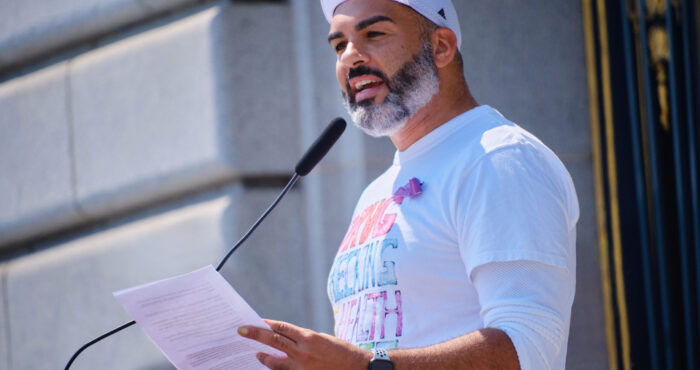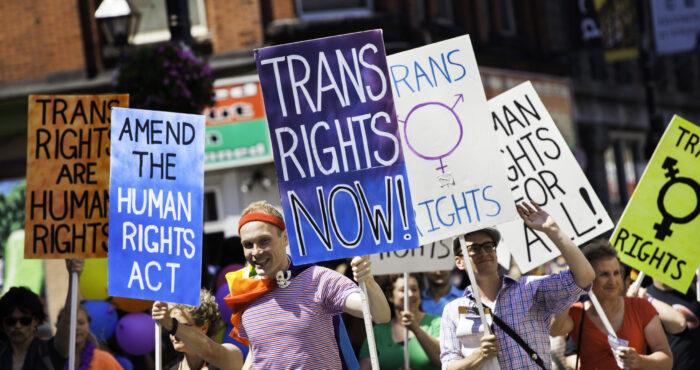Confronting ignorance and fear to end HIV criminalization
In 2009, Kerry Thomas, an African American man living in Idaho, was sentenced to two consecutive 15-year sentences with a minimum time-served of 20 years. Thomas, who is now 54 years old, may be in prison until 2039.
His crime?
Thomas was convicted of attempting to transfer HIV—even though he used a condom and maintained an undetectable viral load when he had sex with his accuser. (The CDC, National Institutes of Health and the National Institute of Allergy and Infectious Diseases confirm that people living with HIV with undetectable viral loads do not transmit HIV to other people.)
A former co-worker, who did not acquire HIV from Thomas, accused him of not disclosing his HIV status before they had sex. Thomas accepted a plea deal hoping to avoid some of the media hysteria surrounding the case.
“Unfortunately, in Idaho the medical facts of the case were not taken into account. They were ignored,” said Thomas during a phone call from prison to attendees of the AIDS 2018 conference. “I definitely regret my failure to adequately disclose my status. But I know that had the science of HIV transmission been taken into account at that time, it’s reasonable to conclude that I would not be serving a 30 year sentence.”
For the past ten years, Thomas has been involved in HIV advocacy efforts to end outdated HIV criminalization laws across the country and around the world. He is joined by a contingent of HIV activists, researchers and clinicians, who argue that HIV criminalization laws are based on fear rather than a current understanding of HIV transmission. And, that criminalizing behavior based on HIV status can actually prevent people from getting tested, knowing their status and taking care of their health.
The Consensus Statement
In July 2018, a group of prominent HIV scientists with expertise in research, epidemiology and patient care published a consensus statement with the hope of aligning the application of criminal law to current HIV science. The authors were prompted, the statement says, by “concern that criminal law is sometimes applied in a manner inconsistent with contemporary medical and scientific evidence: including overstating both the risk of HIV transmission and also the potential for harm to a person’s health and wellbeing.”
The Expert Consensus Statement on the Science of HIV in the Context of Criminal Law urges legal and judicial systems and governments to limit undue prosecutions, and apply the following facts to their application of laws:
- Per sex act, the likelihood of HIV transmission is quite low. A variety of very specific conditions must be met in order for HIV transmission to happen (e.g., there must a specific amount of virus in the transmitted bodily fluid).
- Condoms prevent HIV transmission.
- HIV treatment prevents HIV transmission, and people with undetectable viral loads do not transmit HIV.
- PEP and PrEP significantly decrease the possibility of HIV acquisition.
- Medical male circumcision decreases the possibility of HIV transmission from women to men.
- Risk reduction practices including withdrawal or strategic positioning decrease the possibility of HIV transmission.
- HIV transmission is not possible via saliva through kissing, biting or spitting. Risk of transmission from oral sex is zero to “negligible.”
- HIV is now a chronic infection that can be managed with highly effective antiretroviral therapies. Although HIV requires lifelong treatment, people living with HIV can live long and healthy lives.
“We feel that this document, developed by 20 expert scientists from regions across the world, is an important step to combat the ignorance that underlies the continued existence of laws that criminalize HIV transmission,” the authors wrote in an accompanying editorial to the consensus statement. “Criminalization of HIV transmission creates an unjust public health environment where individuals living with HIV may be fearful about disclosing their status.”
In the U.S., 29 states have HIV-specific criminal laws and eight states have sentencing “enhancements” applicable to people living with HIV. (Check out this guide from The Center for HIV Law and Policy for more information.)
Around the world, approximately 70 countries criminalize non-disclosure of HIV-positive status, exposure to HIV and transmission of HIV “without a scientific basis,” say the authors of the consensus statement. Most cases that have led to prosecution have been based on subjective experiences of “risk,” including some acts like biting or spitting that carry zero risk.
Unfortunately, Kerry Thomas’ experience mirrors those of many others.
Robert Suttle, ending a “contentious” relationship with a partner, had charges filed against him for allegedly not disclosing his HIV-positive status. “Rather than risk a 10-year sentence. I served six months in prison for a conviction under Louisiana’s Intentional Exposure to AIDS Virus statute and was obligated to register as a sex offender for 15 years,” in an editorial for the American Psychological Association.
“Today every person living with HIV in a state with laws that criminalize HIV is just one misunderstanding or disgruntled partner away from finding him or herself in a courtroom,” said Suttle, who is the assistant director of the Sero Project, a network of people living with HIV and allies focused on ending inappropriate criminal prosecutions of people with HIV.
There are many ways to get involved in ending unjust HIV criminalization laws.
Check out the Positive Justice Project at The Center for HIV Law & Policy. There, you will find a short video you can share on social media to help get the word out about why we need to end HIV criminalization laws. You’ll also find their Grassroots Guide to HIV Criminalization, plus contact information for the Project if you want to get involved further.
The Sero Project also has many great resources related to ending HIV criminalization laws, including blog articles and first-person perspectives, news updates on HIV decriminalization initiatives, and info for people living with HIV who need help from prosecution or threat.










